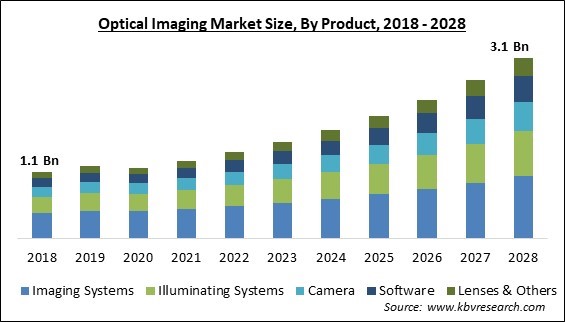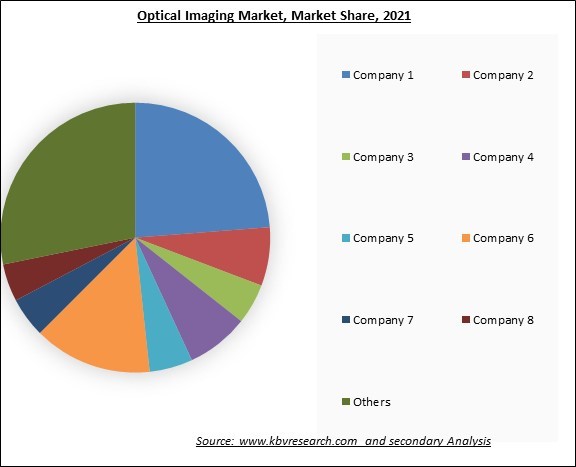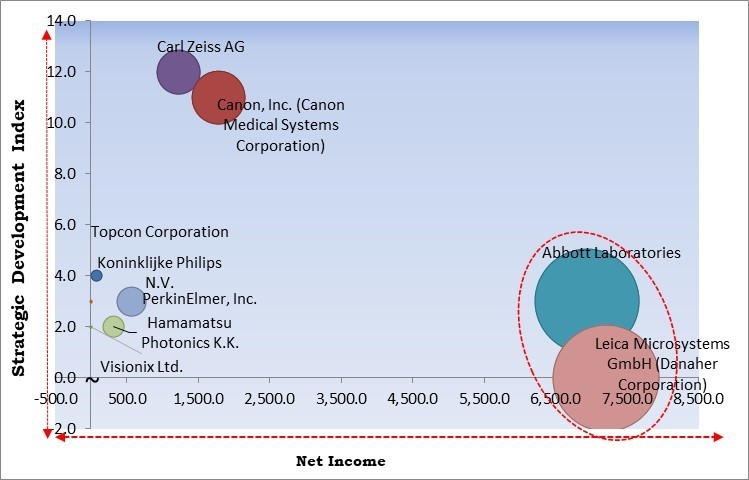The Global Optical Imaging Market size is expected to reach $3.1 billion by 2028, rising at a market growth of 13.1% CAGR during the forecast period.
Optical imaging technologies have great potential for the healthcare sector in terms of improving illness detection, prevention, and treatment. Due to factors such as emerging application areas, increased consumer demand for noninvasive technologies, and an increase in chronic diseases and eye conditions, the market for optical imaging systems is growing. Due to the growing emphasis on early illness diagnosis and the desire for efficient solutions, optical imaging system sales are anticipated to rise quickly.

The science of optical imaging, which employs light to examine cellular and molecular activity in live organisms, is non-invasive and non-ionizing. Electromagnetic radiation, including visible light, contains wave and particle characteristics. Depending on the makeup of the tissue, photons may be absorbed, reflected, or dispersed as they pass through it. Various optical imaging techniques examine these interactions to produce distinctive spectral fingerprints that might provide information about the molecular structure of the target tissue.
For instance, Raman spectroscopy examines the inelastic scattering of light, whereas fluorescence and phosphorescence rely on the emission of light after its absorption. Optical imaging offers a very high spatial resolution in the nanometre (nm) range and may give real-time and quantitative data. Fiberoptic endoscopic probes, which enable tissue lighting and collecting the emitted light from deep inside the body, may partially help overcome this. Moreover, soft tissues exhibit less scattering and absorption in the electromagnetic spectrum's near-infrared (NIR) region than in the visible band, allowing the probing depth to be raised to a few centimeters when utilizing NIR optical imaging.
Fluorescence imaging is used in hybrid tomographic systems like advanced fluorescence-mediated tomography/micro-CT, which provides a useful alternative to traditional PET analysis in drug research. Wide-field NIR fluorescence molecular endoscopy and other device designs have been promoted for enhancing the early detection of esophageal lesions and colorectal adenomas.
The COVID-19 pandemic made it more important for physicians and other healthcare workers to maintain social distancing. Due to COVID-19, optical imaging case volumes have rapidly decreased in several imaging and diagnostic departments. The fall in optical imaging cases seriously impacts the short- and long-term economic stability of all practice settings. The need for optical imaging devices has significantly decreased globally because of COVID-19. The large drop in demand for optical imaging equipment is primarily attributable to canceling of elective operations and the closing of hospitals and diagnostic facilities in various nations due to the pandemic. Also, the decline in outpatient visits is anticipated to restrain market expansion throughout the projection period.
A cutting-edge optical imaging method that can identify changes in the organization of the collagen fibers in the eye sclera is being developed by biomedical engineers with funding from the government. The technique uses a computer model that links certain alterations in sclera proteins to early-onset glaucoma. The new test will allow for early treatment that preserves eyesight and ongoing non-invasive treatment response monitoring. Engineers are developing an optical imaging device for crucial real-time imaging that detects brain blood flow and metabolic processes, including oxygen use. This supports the growth of the regional market.

The leading players in the market are competing with diverse innovative offerings to remain competitive in the market. The illustration shows the percentage of revenue shared by some of the leading companies in the market. The leading players of the market are adopting various strategies in order to cater demand coming from the different industries. The key developmental strategies in the market are Acquisitions, and Partnerships & Collaborations.
Raman scattering of visible, near-infrared, or near-ultraviolet light provides the basis for Raman spectroscopy. The material's molecular vibrations interact with the laser light, causing energy changes that disclose the substance's chemical composition. Uses include the identification of chemical compounds and the crystal and material structure. Raman gas analyzers are used in surgery to monitor the anesthetic gas mixture. The wide usage of optical imaging techniques for diagnosing and treating various diseases is expected to boost the optical imaging market growth.
Health workers are essential to the operation of health systems. Their availability, accessibility, acceptability, and quality are all determinants of expanding healthcare coverage and attaining the right to the enjoyment of the greatest possible level of health. By 2030, the WHO predicts a ten-million-person shortage in the health workforce, mostly in low- and lower-middle-income nations. To varied degrees, governments at all socioeconomic levels have challenges with their workforce's training, employment, deployment, retention, and performance. These elements are assisting the market's expansion in the region.
Based on product, the optical imaging market is segmented into imaging systems, camera, software, illuminating systems and lenses & others. The imaging systems segment dominated the optical imaging market with maximum revenue share in in 2021. This is due to its extensive use in cancer, ophthalmology, and other fields. These systems are frequently used because they provide real-time, micron-level resolution, 1D depth, 2D cross-sectional, and 3D volumetric pictures at imaging depths of up to a few millimeters and no harmful radiation.

On the basis of application, the optical imaging market is divided into pathological imaging and intraoperative imaging. The intraoperative imaging segment garnered a substantial revenue share in the optical imaging market in 2021. This is owing to intraoperative imaging and monitoring, which gives doctors access to physiological information that may be used to guide surgery and enhance recovery time and quality of life in the long run. Optical imaging in this context provides extremely practical, portable, affordable, and real-time solutions sensitive to several physiological factors of interest.
By end user, the optical imaging market is classified into hospitals & clinics, research laboratories and pharmaceutical & biotechnology companies. The research laboratories segment recorded a prominent revenue share in the optical imaging market in 2021. This is due to the increased emphasis on R&D operations to create different new applications of optical imaging. The market is expected to develop as more optical imaging techniques are used in preclinical research and drug discovery procedures. The increasing R&D efforts in the life sciences industry will further boost the segment's expansion in the forecasted period.
Based on the therapeutic area, the optical imaging market is bifurcated into ophthalmology, oncology, cardiology, dermatology, neurology and others. The oncology segment registered the highest revenue share in the optical imaging market in 2021. This is because the optical way of examining tissues can detect both the biochemical and structural aspects of the tissue. It also has the benefits of high sensitivity, low cost, and high resolution. The technique is also gaining popularity since it aids in the early identification of cancer and is non-invasive. As cancer is becoming more common, along with the benefits optical imaging provides in early cancer detection, the segment's growth will surge.
On the basis of technique, the optical imaging market is divided into optical coherence tomography, near infrared spectroscopy, hyperspectral imaging and photoacoustic tomography. The photoacoustic tomography segment garnered a remarkable growth rate in the optical imaging market in 2021. This is because photoacoustic tomography is a hybrid noninvasive imaging technique for both molecular and functional imaging. In addition, the demand for noninvasive technology is growing, and optical tomography performs better in biomedical imaging than its traditional optical imaging competitors. All these reasons are anticipated to contribute to the segment's expansion in the projected period.
| Report Attribute | Details |
|---|---|
| Market size value in 2021 | USD 1.3 Billion |
| Market size forecast in 2028 | USD 3.1 Billion |
| Base Year | 2021 |
| Historical Period | 2018 to 2020 |
| Forecast Period | 2022 to 2028 |
| Revenue Growth Rate | CAGR of 13.1% from 2022 to 2028 |
| Number of Pages | 338 |
| Number of Table | 583 |
| Report coverage | Market Trends, Revenue Estimation and Forecast, Segmentation Analysis, Regional and Country Breakdown, Competitive Landscape, Market Share Analysis, Companies Strategic Developments, Company Profiling |
| Segments covered | Product, End User, Technique, Application, Therapeutic Area, Region |
| Country scope | US, Canada, Mexico, Germany, UK, France, Russia, Spain, Italy, China, Japan, India, South Korea, Singapore, Malaysia, Brazil, Argentina, UAE, Saudi Arabia, South Africa, Nigeria |
| Growth Drivers |
|
| Restraints |
|
Region-wise, the optical imaging market is analyzed across North America, Europe, Asia Pacific, and LAMEA. The North America region generated the highest revenue share in the optical imaging market in 2021. This is due to the availability of qualified people, a strong research infrastructure, and government attempts to support technical improvement in the sector by providing investments and money. Moreover, quicker adoption of technologically improved items in the area is anticipated to accelerate market expansion further.
Free Valuable Insights: Global Optical Imaging Market size to reach USD 3.1 Billion by 2028

The major strategies followed by the market participants are Acquisitions. Based on the Analysis presented in the Cardinal matrix; Abbott Laboratories and Leica Microsystems GmbH (Danaher Corporation) are the forerunners in the Optical Imaging Market. Companies such as Carl Zeiss AG and Canon, Inc. (Canon Medical Systems Corporation) are some of the key innovators in Optical Imaging Market.
The market research report covers the analysis of key stake holders of the market. Key companies profiled in the report include Carl Zeiss AG, Leica Microsystems GmbH (Danaher Corporation), Abbott Laboratories, Canon, Inc. (Canon Medical Systems Corporation), PerkinElmer, Inc., Topcon Corporation, Hamamatsu Photonics K.K., Koninklijke Philips N.V., Heidelberg Engineering, Inc. and Visionix Ltd.
By Product
By End User
By Technique
By Application
By Therapeutic Area
By Geography
The global Optical Imaging Market size is expected to reach $3.1 billion by 2028.
Technological progress are driving the market in coming years, however, Lack of healthcare workers restraints the growth of the market.
Carl Zeiss AG, Leica Microsystems GmbH (Danaher Corporation), Abbott Laboratories, Canon, Inc. (Canon Medical Systems Corporation), PerkinElmer, Inc., Topcon Corporation, Hamamatsu Photonics K.K., Koninklijke Philips N.V., Heidelberg Engineering, Inc. and Visionix Ltd.
The Hospitals & Clinics segment acquired maximum revenue share in the Global Optical Imaging Market by End User in 2021 thereby, achieving a market value of $1.6 billion by 2028.
The North America market dominated the Global Optical Imaging Market by Region in 2021, and would continue to be a dominant market till 2028; thereby, achieving a market value of $1 billion by 2028.
Our team of dedicated experts can provide you with attractive expansion opportunities for your business.

